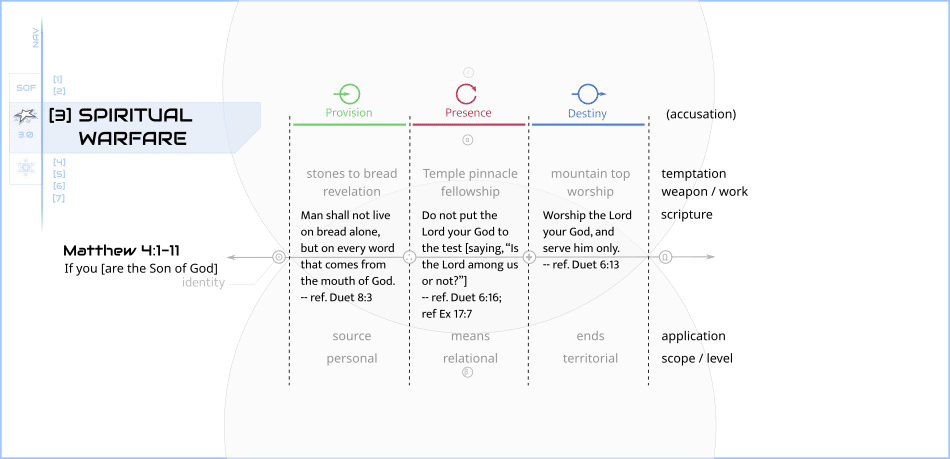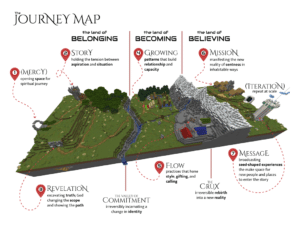This is Session 2 of the Prince of Peace: Jesus and Peacebuilding from the Election to the Holidays webinar series. (Click here to sign up for session invites.)
This session is about what we do when the people around us challenge our peace. It requires us to draw on something deeper in order to continue extending the hospitality of the Gospel. We’ll talk with Jason Storbakken of Brooklyn Peace Center / Manhattan Mennonite Fellowship about his lifestyle of radical hospitality and how he uses practices that nurture inner peace so he can continue to welcome others.
In this session: Why a painful Thanksgiving conversation at my Uncle’s house made me stop going and what I wish I would have known then. The connection between peacebuilding inwardly and outwardly. The insight from James 4 about the internal origin of conflict. How The Three Temptations are e template for doing inner work to produce outward peace. Plus resources for building your own inner peace for hospitality.
Session Notes
Here’s some of the things mentioned in this session that you can explore on your own. Please remember that Camp offers these links and resources as explanatory documents as part of a conversation that includes some hard questions worth asking and sharing them here does not imply an endorsement or official position of Camp, it’s board, staff, or constituents. We are a diverse community whose position is peace and work is love!
What to do when you’re triggered by someone in your circle
I told the story in the first session about a painful Thanksgiving in my family. Several different families of the clan had gathered at my uncle’s house for the celebration and the conversation fell on politics. The room was very divided with my younger cousins supporting the more progressive party and candidates and the older generation supporting conservatives. No one started throwing food, but when the older generation all said the politics of the younger was due to their ignorance, you could see the pain was real.
I sat there silently in a kind of horror. It wasn’t the politics that was so disappointing. It was the realization that not seeing and hearing each other was doing real damage. I left that day thinking I wouldn’t be back for Thanksgiving, but also kicking myself for not have the wherewithal in me to connect with my cousins about what just happened.
What should we do if someone in our circle triggers us? What if this effects our openness to show hospitality to this person or to others? How can we have the resources within us to respond and show hospitality even if its difficult?
James 4: Conflict often has an internal origin
What causes fights and quarrels among you? Don’t they come from your desires that battle within you? 2 You desire but do not have, so you kill. You covet but you cannot get what you want, so you quarrel and fight. You do not have because you do not ask God. 3 When you ask, you do not receive, because you ask with wrong motives, that you may spend what you get on your pleasures.
James 4:1-3 NIV
At first, we might be tempted to think James is only talking about bad people, like criminals, who have allowed their internal compass to decay to the point that they are physically hurting others. But actually, when I think about it more deeply, I think James is right about nearly all conflict.
Think about the story of my painful Thanksgiving. I think I can say with some insider knowledge that the generation of my elders are greatly concerned with the direction of the younger generation. But in that, they’ve also taken a sort of personal wound: the opinions of the young are a rejection, not just of the elder’s way, but of them as people. Maybe that add enough energy to concern to become harsh and hurting. Maybe, if they had worked out that need for validation by asking God instead, they wouldn’t have caused the pain that happened. To be honest, I think I’ve hurt a few people from the internal wars I have going on between the need to right and the desire to be loved.
If James is right, and the origin of conflict is the war between the different things we desire within us, then that is probably where the work of peacebuilding has to begin.
Jesus and Spiritual Warfare
When it comes to the struggle within, Jesus has a few things to say. But maybe the most powerful is the story of how he was led by the Spirit into the wilderness for 40 days to be tested by Satan:
Then Jesus was led up by the Spirit into the wilderness to be tempted by the devil. 2 When he had fasted forty days and forty nights, he was hungry afterward. 3 The tempter came and said to him, “If you are the Son of God, command that these stones become bread.”
4 But he answered, “It is written, ‘Man shall not live by bread alone, but by every word that proceeds out of God’s mouth.’”
5 Then the devil took him into the holy city. He set him on the pinnacle of the temple, 6 and said to him, “If you are the Son of God, throw yourself down, for it is written,
‘He will command his angels concerning you,’ and,
‘On their hands they will bear you up,
so that you don’t dash your foot against a stone.’”7 Jesus said to him, “Again, it is written, ‘You shall not test the Lord, your God.’”
8 Again, the devil took him to an exceedingly high mountain, and showed him all the kingdoms of the world and their glory. 9 He said to him, “I will give you all of these things, if you will fall down and worship me.”
10 Then Jesus said to him, “Get behind me, Satan! For it is written, ‘You shall worship the Lord your God, and you shall serve him only.’”
11 Then the devil left him, and behold, angels came and served him.

I believe Jesus response is very insightful in each of these temptations. More than just quoting the rules to rebuff Satan’s attempts at trouble-making, Jesus is really showing how we fight spiritually against the origins of evil within ourselves.
The First Temptation: Stones to Bread
It’s no accident Jesus uses Deuteronomy 8:3. The whole of chapter 8 is a reminder by God not to forget about Him in Israel’s quest and enjoyment of provision. The whole purpose of time in the Wilderness, whether the 40 Years of Wandering or the 40 Days of Fasting, is testing and refinement to fix in us that the source of existence and reality is God’s revelation and not our striving. This is a core personal temptation because humans can internally justify almost any evil by claiming we were just providing for ourselves. In fact, this is such a deep tendency, we seldom even have to think it through. Self-provision without regard to consequences is the human default — it’s pretty much automatic.
The core Accusation of Satan is, “God will not provide.” He won’t provide the things we need, so we must get them for ourselves, even at the cost of others. “That’s just the way the world works.” Satan also wants us to believe God doesn’t want to provide for us for various reasons. He can almost always find a disappointed expectation to point to in order to say, “See, if He cared about you, you’d have this or that, or be successful or validated in this or that way.” When we don’t seek “every word that proceeds from the mouth of God,” we cease to turn to him for what we need, and the lie turns into all sorts of conflict — thought in Western capitalism it can come out in legal and passive-aggressive ways.
EX: You have to perform. I frequently find myself thinking or feeling deep within — “unless you perform to people’s expectations, you’ll be toss aside.” I’m a task oriented person, but this accusation can make me overly focused on to-do lists over people. I’ve hurt people, including me own family, because I wasn’t present or responsive when it mattered, and I justified it by the lie I had to in order to provide for myself and others. If I cultivated revelation to tell me the balance between task and connection, wouldn’t I thankfully enjoy more intimacy with God and others while getting done what really matters?
EX: Our leader’s unwillingness to slow down or limit AI. Many regular people are deeply suspicious of AI. Tech leaders and academics have long pointed out the damage it could do and called for regulation. News media are starting to point out the damage as it happens in real time. However, no one seems to be the adult in the room to put any real rules in place. The reason why we don’t address this is we’re worried that if we limit our competitive ability with rules and slip from the front of the AI growth curve, we’ll loose out economically, politically, and militarily. Meanwhile, AI can run amuck with our jobs, our children’s mental health, our public discourse, and more.
How could cultivating space for revelation and a deep sense and thankfulness for God’s provision make us more ready to build peace and open our lives in hospitality?
The Second Temptation: Temple Pinnacle
Satan caught on to Jesus’ game in the second temptation and used Scripture himself. But we have to ask ourselves, even if God would catch you, what’s so tempting about throwing yourself off a cliff? Well, the temple complex is the center of Jewish religious and political life. If someone demonstrated such a supernatural feat, they would be instantly recognized as the promise Messiah. Actually, you know what — sounds like a pretty good idea, Jesus.
Except, what would be the ramifications of Jesus revealing his Messiah-ship in this way? First, there’s the Roman-Jew problem. The Jews would take Jesus straight to the palace to make him a King and the Romans would send an army to squash the revolt. Yes, such a demonstration of superiority by Jesus would require a power-play by superior forces.
Second, there’s the Celebrity problem. The thing about a celebrity is you can’t really be them, even though you’d rather be them than yourself. That’s bad for the real Gospel because the real Gospel is participatory. While we’re not saved by works, we’re saved in some way because we’re involved in working out our salvation. The core of the Gospel is intimacy with Jesus by being like him — generating deep knowing of his being by joining him in doing. It’s really conspicuous that Jesus empowered his followers to do everything he did, and even promised they would do greater things.
In this context, Jesus response makes sense. He quotes Deuteronomy 6:16: “You shall not tempt Yahweh your God, as you tempted him in Massah.” This is a reference to Exodus 17:5-7 when Israel tested (Massah) God by quarreling (Meribah) because they were ready to kill Moses over lack of water. The Exodus story says, Isreal “tested Yahweh, saying ‘Is Yahweh among us, or not?” Jesus isn’t talking about manipulating God or forcing his hand. He’s talking about God’s frustrated patience with his kids who fight amongst themselves because they forget he’s right there to work things out.
This is the temptation of means and the root of much relational sin. Any means that doesn’t move forward in real fellowship with God and others will lead to damaged relationships and social problems down the road. Abuse of others begins by doubting God is with us or with them or both. Not seeing or caring from someone is always a failure to see God in them or with them. If we thought God was among us, would be even dare to treat people the way we do or fight with them?
EX: Being right means I might (or might not) care about you. I’m pretty serious about the pursuit of theological truth and good missions practice. This can create a kind of arrogance that I’m always right. Sometimes this leads me to think other people don’t understand God or the Christian life in the right way, my way. Then, rather than seek what God is really doing in their life (as if he can only do one thing one way or be with one person), I try to humanly intervene with clumsy results or I justify writing the person off as flawed or not worth my time.
EX: Historical justifications of colonialism, racism, sexism, and classism. Some people point out that Christendom has often demanded or gone along with the domination and oppression of various groups of people and justified this by saying “God is with us, but not with them (or less so).” It’s pretty hard to deny this given that such justifications were written in the governing documents and correspondence of the dominators during this period.
How could inner practices of recognizing God among the people around us change the means and fellowship of our hospitality? How might this effect too whom and from whom we share hospitality?
The Third Temptation: Mountain Top
Satan’s offer of all the kingdoms of the world begs a serious question: Who gave them to Satan in the first place? No where in Scripture does God give over human kingdoms to Satan. In fact, quite the opposite — God maintains that He sets up kingdoms and that the people and land belong to Him. So one could conclude, if anyone gave kingdoms over to Satan, it would have to be humanity. That kind of makes sense: much of the history of kingdom and empire has relied on uses or power, violence, and deceit that fits Satan’s M.O..
Jesus certainly knows this. So what’s the temptation? Well, the Prophets make clear that it’s Jesus destiny to one-day rule all the kingdoms of the world as the King of Kings. The difference is whether the ends of Jesus’ rule would justify Satan’s means to get there, avoiding the coming cross in the process. Jesus replies by quoting Deuteronomy 6:13 which says, “You shall fear Yahweh your God; and you shall serve him, and shall swear by his name.”
English translations often turn “fear” into “worship” in these verses, and that’s ok. But our individualism sometimes makes it hard for us to feel awe or reverence towards authorities, so we can miss the sense of God having rightful power over us in worship. We often come to worship thinking it’s a cathartic emotional experience where we get without the sense of awe and duty in the true meaning of worship which is mostly about what we give to our Lord in acknowledgement of who he is. In fact, all worship should come from the confession that God is worthy of everything — even our very lives — and, of course, our destiny. In the case of Jesus, this means he could not refuse to cross to achieve his destiny without denying the worship and service of his Father to who all human destinies belong.
This temptation of ends is territorial. When we do not consider God worthy of our destiny, we start thinking the field of our life and work is our own territory, not God’s — which really ends up turning our territory into the territory of Satan. On the other hand, when let God determine the ends through real worship, we gain the territory of the Kingdom of God.
EX: Keeping up with the Joneses. Sometimes I get stuck in a cycle of internal score-keeping. It’s an easy thing these days, with everyone posting their best life on social media. I can start to feel that the sacrifices needed to live a life of service and mission are robbing me of how my life is supposed to go. I start to feel stupid and fantasize about where I could be if I just joined in the pursuit of “the Joneses”. When I get stuck in this frame of mind, I isolate because I’m not feeling God — and therefore others — are really worthy of my life and my best effort.
EX: The Seven Fires Prophecy. There was a Native American prophecy about New York City that named it’s destiny as a cross-roads of the world. Four hundred years before Henry Hudson, the natives were told, “Visitors from the East will come in a great canoe, bearing a great teaching. If the first nation and the newcomers join in brotherhood, it will lead to the Rainbow People.” This came with a warning that if they did not join in brotherhood, NYC would become a place of a great calamity spreading chaos and unrest around the world. You can judge for yourself to what extent the first or second prediction of the prophecy came true — but imagine if Hudson and all who followed had acted like Jesus; what would that have done to the destiny of our city?
How inner worship allow you to release your life into the hands of God so he can use it for his ends? How might this help you see God and other people as worthy of your time, energy, attention, and resources?
The Spirit is Inner Peace
Consider these words Jesus said to his disciples just before his arrest and execution (John 14). They were about to endure a severe trauma — one that would potentially change their ability to show hospitality to the many people destined to be included in the movement of God.
Our peace is rooted in the eternal promise of God’s hospitality.
“Don’t let your heart be troubled. Believe in God. Believe also in me. 2 In my Father’s house are many homes. If it weren’t so, I would have told you. I am going to prepare a place for you.
Through the Spirit, we practice hospitality to Jesus himself.
16 I will pray to the Father, and he will give you another Counselor, that he may be with you forever: 17 the Spirit of truth, whom the world can’t receive; for it doesn’t see him and doesn’t know him. You know him, for he lives with you, and will be in you. 18 I will not leave you orphans. I will come to you…
23 Jesus answered him, “If a man loves me, he will keep my word. My Father will love him, and we will come to him, and make our home with him.
When we show hospitality to the Holy Spirit, we’ll have peace through inner cultivation
26 But the Counselor, the Holy Spirit, whom the Father will send in my name, will teach you all things, and will remind you of all that I said to you. 27 Peace I leave with you. My peace I give to you; not as the world gives, I give to you. Don’t let your heart be troubled, neither let it be fearful.
Developing inner peace is not just a human effort. Rather, it happens when we welcome the Spirit into the hospitality of our hearts just as God welcomes us into his eternal hospitality. This has the power to transform even situations of the worst trauma and conflict into opportunities for hospitality, redemption, and the advancement of Christ’s movement of reconciliation.
Resources to Developing Inner Peace
Jason provides this book list based on research he completed for his dissertation A Liberation Theology of Sabbath:
Bass, Dorothy C. Receiving the Day: Christian Practices for Opening the Gift of Time. San Francisco: Jossey-Bass Press, 2000.
Berry, Wendell. This Day: Sabbath Poems Collected and New 1979-2013. Berkeley: Counterpoint, 2014.
Boff, Leonardo. Church, Charism and Power: Liberation Theology and the Institutional Church. Eugene, OR: Wipf & Stock Pub, 2012.
Brueggemann, Walter. Sabbath as Resistance: Saying No to the Culture of Now. Louisville, KY: Westminster John Knox Press, 2017.
Buchanan, Mark. The Rest of God: Restoring Your Soul by Restoring Sabbath. Nashville: Thomas Nelson, 2006.
Cone, James. A Black Theology of Liberation. Maryknoll, NY: Orbis Books, 1989.
Cone, James. God of the Oppressed. Maryknoll, NY: Orbis Books, 1997.
Copeland, M. Shawn. “A Thinking Margin: The Womanist Movement as Critical Cognitive Praxis.” In Deeper Shades of Purple: Womanism in Religion and Society, edited by S. Floyd Thomas, 224–237. New York: New York University Press, 2006.
Dawn, Marva J. Keeping the Sabbath Wholly: Ceasing, Resting, Embracing, Feasting. Grand Rapids, MI: W.B. Eerdmans, 1999.
Dawn, Marva J. The Sense of the Call: A Sabbath Way of Life for Those Who Serve God, the Church, and the World. Grand Rapids, MI: W.B. Eerdmans, 2006.
Foster, Richard J. Celebration of Discipline: The Path to Spiritual Growth. San Francisco: HarperOne, 2018.
Freire, Paulo. Pedagogy of Freedom: Ethics, Democracy, and Civic Courage. Lanham, MD: Rowman & Littlefield Publishers, 2001.
Freire, Paulo. Pedagogy of the Oppressed. New York: Bloomsbury Academic, 2014.
Gutiérrez, Gustavo. A Theology of Liberation: History, Politics, and Salvation (Revised ed.). Maryknoll, NY: Orbis Books, 1988.
Heschel, Abraham Joshua. The Sabbath. New York: Farrar, Straus and Giroux, 1951.
Heschel, Abraham Joshua, and Susannah Heschel. Moral Grandeur and Spiritual Audacity: Essays. New York: Farrar, Straus and Giroux, 2001.
Isasi-Díaz, Ada María. En La Lucha/In the Struggle: Elaborating a Mujerista Theology. Minneapolis: Fortress Press, 2004.
Kaplan, Aryeh. Sabbath: Day of Eternity. New York: NCSY, 1998.
Kendi, Ibram X. Stamped from the Beginning: The Definitive History of Racist Ideas in America. New York: Nation Books, 2017.
Klagsbrun, Francine. The Fourth Commandment. New York: Harmony Books, 2002.
Liechty, Daniel. Andreas Fischer and the Sabbatarian Anabaptists: An Early Reformation Episode in East Central Europe. Scottdale, PA: Herald Press, 1988.
Moltmann, Jürgen. “The Sabbath: The Feast of Creation.” In God in Creation: An Ecological Doctrine of Creation, 276–304. London and San Francisco: Harper & Row, 1985.
Muller, Wayne. Sabbath: Finding Rest, Renewal, and Delight in Our Busy Lives. New York: Bantam Books, 1999.
O’Flaherty, Edward, Rodney L. Petersen, and Timothy A. Norton, eds. Sunday, Sabbath, and the Weekend. Grand Rapids, MI: W.B. Eerdmans Publishing Company, 2010.
Schaper, Donna. Sabbath Keeping. Cambridge, MA: Cowley Publications, 1999.
Shulevitz, Judith. The Sabbath World: Glimpses of a Different Order of Time. New York: Random House, 2011.
Stone, Bryan, and Claire Wolfteich. Sabbath in the City: Sustaining Urban Pastoral Excellence. Louisville, KY: Westminster John Knox Press, 2008.
Swoboda, A. J. Subversive Sabbath: The Surprising Power of Rest in a Nonstop World. Grand Rapids: Brazos Press, 2018.
Wirzba, Norman. Living the Sabbath: Discovering the Rhythms of Rest and Delight. Grand Rapids, MI: Brazos Press, 2006.
Wolfteich, Claire. “Re-Claiming Sabbath as Transforming Practice: Critical Reflections in Light of Jewish-Christian Dialogue.” In Religion, Diversity, and Conflict: Proceedings of the International Academy of Practical Theology, edited by Edward Foley, 247-258. Berlin: LIT Verlag, 2011.
Jason has also penned some books you might enjoy: https://storbakken.org/works/
If you’d like to find out more about Jason’s projects, check out Radical Living (NYTimes Article) | Brooklyn Peace Center | Manhattan Mennonite Fellowship | The Bowery Mission
The Challenge
In the first session, we challenged our community to use the MCC Peace Practices to posture themselves from now to Thanksgiving for dialog with those who are different from themselves.
Curiosity. Be curious, inviting a diversity of ideas and opinions.
Discovery. Focus on what matters.
Engagement. Invite the best in yourself and others.
Dialogue. Listen together for insights and deeper questions.
Empathy. Seek to understand rather than persuade.
Authenticity. Speak from the heart, contributing your own thinking and experience.
Dignity. Consider power dynamics.
Transformation. Welcome creativity.
(From Peaceful Practices: A guide to healthy communication in conflict, pg 9)
How’s that going? Does anyone have a story to share?
Let’s add to this a second challenge: From now till Christmas, spend at least 15 minutes a week developing your inner peace through contemplating scripture, meditation, or prayer.
Share:
Story of A Tree
A fresh tree stump is like a magnet to me. I have to look at the rings to read the tree’s story. It’s at once humbling to look inside a living thing that is much longer-lived than yourself, but also encouraging to see how it weathered the ups and downs of life, the good times…
Camp’s Political Endorsement
I’ve been eligible to vote for 30 years, but – like many in my generation – I’ve never felt like a politician or party truly represented me. They may win me at one point, but they’ll loose me in the next. When I have voted, it always seemed I was going to the polls holding…
Prince of Peace
Camp’s mission statement says we offer people the opportunity to fellowship in “serenity”. Serenity literally means “clear skies” — a state of refuge from the storms of the World. Right now, our World does feel pretty stormy with a divided country going into an election and numerous disasters and conflicts abroad and at home. Because…
Mapping Spiritual Journey with NYC Leaders
In order to know where you’re going, it’s a good idea to know where you are. One of the best ways to know where you are is a good map. The NYC LMC District is seeing growth in many of our churches right now, and opportunities for re-inventing and re-launching in others. But these are…
How Do You Define Mission?
When somebody says “I’m on a mission”, what do you think of? If the word is said in church, what is the first thing that comes to mind? You may think of someone clutching a Bible in a jeep jostling down jungle roads. Or you cold be thinking of a caring staff at an remote…
A Special Request for Baby Vivian
Serving God, while the greatest of blessings, is no guarantee that everything will go well in life. Tragedy, difficulty, and suffering can find any of us at any moment, and when it does, the people of God are essential in helping us navigate the valleys of shadow with Jesus by our side. Ben Gosnell came…
You Can Always Come Home
In the pursuit of mission, I’ve moved around a lot as an adult. To be perfectly honest, I haven’t found a place since Mom and Dad’s house that I felt was mine — a place I could call home. If you find yourself longing for home, you’re in some pretty good company. It says in…
Map Makers Project
Camp is a big place and we have some big plans. But this raises a big question: Just where is everything? In the past, we asked around and maybe somebody would know. Now, we’d like to get all that information down on a map. We’ll use it to maintain the grounds, plan maintenance projects, and…
Welcoming Wisdom: Cabin 2 Opens in Promise Woods
We’re very pleased to announce that Cabin 2 “Wisdom” is now open in Promise Woods for retreat groups and other guests. Wisdom is our 5th (of 6) bunk cabin to be completed and it sleeps 10 in the spacious bunk room and two more in the cozy bedroom. Like all of our camper-style cabins, it…
Homecoming $20k Match: Investing in Camp is investing in each other!
When someone gives a gift to Camp, they’re not just supporting our organization. Their gift is actually an investment in the life of our community of churches. They are demonstrating their faith in the vision Jesus has of life together: that our fellowship has the power the change us and the world. In this faith,…
- « Previous
- 1
- 2
- 3
- 4
- Next »










